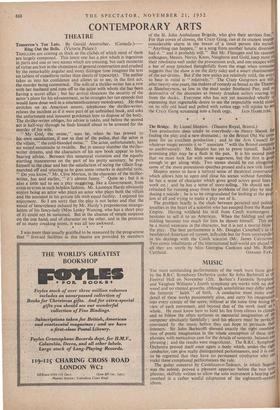CONTEMPORARY ARTS
THEATRE
THRILLERS are coming as thick as the clichds of which most of them are largely composed. This latest one has a plot which is ingenious in parts and one or two scenes which are amusing, but such moments of virtue are lost in the clumsiness of general construction and crushed by the remarkably angular and stony dialogue (one imagines the text on tablets of cuneiform rather than sheets of typescript). The author takes us into his confidence and allows us to see, in the first act, the murder being committed. The wife of a thriller-writer has a row with her husband and runs off to the actor with whom she has been having a secret affair but her arrival threatens the security of the actor's plans for his advancement, so he strangles her (an episode that would have done well in a nineteenth-century melodrama). He then switches on an American accent, telephones the thriller-writer, relates the incident as if it were part of an unfinished book, and asks the unfortunate and innocent gentleman how to dispose of the body. The thriller-writer obliges, his advice is taken, and before the second act is half-way through he finds himself about to be arrested for the murder of his wife.
• " My God, the swine," says he, when he has Proved to his own .satisfaction, if not to That of the police, that the actor is the villain, " the cold-blooded swine." The actor, unfortunately, has no waxed moustache to twiddle. But in uneasy slumber the thriller- writer dreams, and the characters of his new book appear to him, bearing advice. Between this unnatural visitation and the equally startling manoeuvres on the part of his pretty secretary, he puts himself in the clear and has the satisfaction of seeing the villain frog- marched off and uttering as he goes some remarks in doubtful taste. " Do you know," Mr. Clive Morton, in the character of the thriller- writer, has said earlier, " it's almost funny." Quite so ; but it is also a little sad to see a 'play staggering, like a Government, from crisis to crisis in such helpless fashion. Mr. Laurence Hardy obviously enjoys being an actor who plays an actor who plays both the villain and the innocent in his private life with equal facility. I enjoyed his enjoyment. So I am sorry that the play is not better and that the mood of benevolence induced by. Mr. Hardy's preposterous strangu- lation of his fancy-lady (Miss Lesley Wareing, who has a short play of it) could not be sustained. But in the absence of simple suspense on the one hand, and of character on the other, and in the presence of so many creaking joints, it was all too awkward.
I was more than usually gratified to be reassured by the programme that " first-aid facilities in this theatre are provided by members of the St. John Ambulance Brigade, who give their services free For that coven of clowns, the Crazy Gang, can at its craziest inspire considerable alarm in the breast of a timid person like myself' " Anything can happen," as a song from another lunatic diversion had it, " and it probably will." But Mr. Flanagan and his raucous colleagues, Messrs. Nervo, Knox, Naughton and Gold, keep most of their rowdiness well under the proscenium arch, and one escapes w a bar of soap (pitched thoughtfully from the stage when someo suggests that the show is on the dirty side) and a smart chastisemen of the ear-drums. But if the new antics are relatively mild; the wo to bear in mind is " relatively." The Crazy Gangsters are still after twenty-one years, the makers of comedy as broad as the Than. c at Shoeburyness, as low as the mud under Southend Pier, and a, destructive of the decencies as twenty drunken sailors roaring tit from the docks. Everyone who has not yet succeeded wholly iu repressing that regrettable desire to see the respectable world stop on its silly old head and pelted with rotten eggs will rejoice to the Crazy Gang screaming into a fresh orgy. lAIN HAMILTON.










































































 Previous page
Previous page